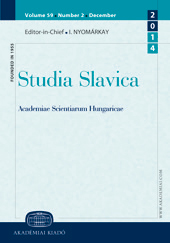Основные направления перцептивно-логической эволюции лексики русского языка
The main directions of the perceptually-logical evolution of the vocabulary of the Russian language
Author(s): Sergey PopovSubject(s): Logic, Lexis, Psycholinguistics, Cognitive linguistics, Eastern Slavic Languages
Published by: Akadémiai Kiadó
Keywords: lexicology; Russian; lexis; perception; logic; evolution;
Summary/Abstract: The purpose of this paper is to analyze the manifestations of the influence of perceptual-logical components of thinking on the evolutionary processes in the Russian lexis. The study is in line with a cognitive and evolutionary approach. Based on the information of anthroponymic sciences about degrees of perception and the quality of logics, this approach allows to take a deeper view on the main reasons of the phenomena. The review of historical transformations of the Russian lexis in terms of its perceptual-logical evolution suggests that native speakers of Russian tend to optimize the lexical system of Russian in a logical way: 1) by generalizing the lexical meanings; 2) by creating abstract vocabulary; 3) by word formation with the help of a variety of derivational means, including borrowings; 4) by overcoming mnemonic shortage using two available, metaphorical and metonymic, opportunities to create new lexical meanings; 5) by getting rid of the logical inconsistency of polynomials; 6) by distinguishing words derived from Church Slavonic and their native Russian equivalents; 7) by getting rid of the vernacular, not required for communication by the overwhelming majority of native speakers; 8) by logically returning obsolete nominations for communication needs; 9) by continuing the development of polysemy at the present time.
Journal: Studia Slavica Academiae Scientiarum Hungaricae
- Issue Year: 62/2017
- Issue No: 2
- Page Range: 343-353
- Page Count: 11
- Language: Russian
- Content File-PDF

